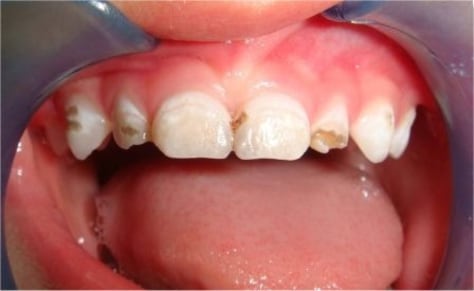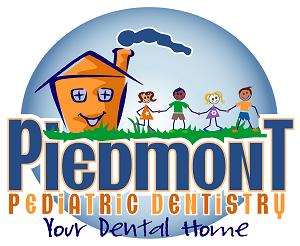When Rachel Sarah took her daughter in for her first dental checkup a few years ago, she got a surprise. Not only did her 24-month-old have two cavities in her baby teeth, the pediatric dentist suggested she might have “caught” them from her mom.
“The dentist handed me this piece of paper that talked about saliva transfer,” said Sarah, a 37-year-old writer from San Francisco. “It said not to share cups or utensils or food and said, ‘No kissing your kid on the lips.’ I was shocked; I’d been taking a bite of food and then giving her a bite since she started eating. I told the dentist I’d never heard of this and he said these were new findings.”
As it turns out, studies about the transmission of cavity-causing bacteria from mom to baby have been published for 30 years. The primary culprit is Streptococcus mutans, a bacteria that can pass from person to person through the transfer of saliva, such as sharing utensils, blowing on food, and yes, even kissing that sweet little bundle of joy on the mouth.
According to a 2008 study in Pediatric Dentistry, “strong evidence demonstrated that mothers are a primary source of MS [mutans streptococci] colonization of their children; a few investigations showed other potential sources … notably fathers.”
“There have been many, many studies,” said Dr. Jane Soxman, a pediatric dentist from Allison Park, Pa. “It’s well-documented. You can’t blame it all on kissing a child on the lips — that’s one of several different factors that would have to be working together. But the main thing to know is that tooth decay is a bacterial infection and you can spread it from one person to another during the window of infectivity, which is during infancy and especially during the time of tooth eruption. That’s when the teeth are most vulnerable. It’s as if you had a bad cold and were kissing your child, you would spread the cold virus.”
Only parents (or caregivers) with active tooth decay can spread the Streptococcus mutans bacteria through the transfer of saliva. And Soxman stressed that the transmission of bacteria-laden saliva is just one piece of the puzzle. Tooth decay is caused by a combination of factors, including the transfer of infectious saliva, genetics, oral hygiene, and feeding practices, such as letting your baby constantly suck on a sippy cup full of juice or milk or other sugar-laden liquid. (Bacteria uses the sugar to produce acid, which breaks down enamel.) Baby teeth are particularly vulnerable to decay.
“When teeth first come into the mouth, when they first erupt, the enamel is very soft,” said Soxman. “They’re brand new virgin surfaces and are very susceptible.”
Video: Are cavities contagious? But the decay won’t just impact baby teeth. If the bacteria are allowed to thrive, Soxman said, they will colonize and stick around for years, attacking the permanent teeth when they come in.
The American Academy of Pediatric Dentistry recommends that parents have their child evaluated by a dentist when the first tooth erupts, or no later than their first birthday.
Chew Xylitol gum
Luckily, there are preventative measures that can help kick the bacteria to the curb. A January 2010 study in the Journal of Dental Research found that the children of moms who chewed Xylitol gum (starting in the sixth month of pregnancy) “were significantly less likely to show MS colonization.”
“If a woman is decay-active, she should be chewing Xylitol in the third trimester so when the baby’s born, the chance of transmission of decay-causing bacteria will be reduced,” said Soxman. “She should also have her teeth cleaned thoroughly during the second and third trimester.”
Cutting back on saliva-transferring behaviors — such as utensil-sharing, toothbrush sharing, blowing on baby’s food, pre-chewing baby’s food and cleaning off the pacifier with your own mouth — will also help.
But some say that’s easier said than done.
“It’s one thing to tell parents who have active decay to be extra cautious, and it’s something to be aware of for the rest of us, but I don’t think I’d be able to completely eliminate those behaviors,” said Marcy Hogan, a 29-year-old stay-at-home mom from San Jose, Calif. “They’re very natural behaviors and actions. I don’t want to avoid kissing my son and I don’t know how I’d get around blowing on his food. Sometimes it’s too hot and kids are not very patient.”

Courtesy of Dr. Jane Soxman
Dr. Stephanie Su, a pediatric dentist and mother of two from Redmond, Wash., said she tries to stress preventative measures as much as possible since saliva transfer between parent and child is almost “unavoidable.”
“When you look at a lab test, yes, there’s transfer of bacteria, but in real life, you’re not going to be able prevent that. You can’t live in a bubble,” she said. “But you can maintain good hygiene practices and a good diet, and the parents can take care of their own oral health and focus on preventative care like flossing and dental checkups and chewing Xylitol gum if they’re at high risk for decay.”
Both dentists also point to a surefire workaround.
“You could do just about everything as long as you wipe that baby’s mouth out repeatedly with a clean wet cloth,” said Soxman. “I tell parents to wipe the baby’s mouth out as often as they change the diaper. Wipe the tongue, the teeth, and the cheeks from infancy on. Then the colonies of bacteria won’t be established.”
